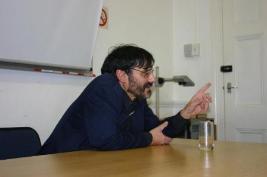
None of us would take seriously a football reporter who didn’t know the rules of the game. Why, then, must we take seriously reporting on Mangaung which does not know how the ANC chooses its leaders?
Increasingly, reporting on politics is based more on repeating what politicians tell reporters to advance their cause – and less on knowing how processes work. Coverage of Mangaung is a good example.
Over the weekend, we were bombarded with reports telling us which candidates KwaZulu-Natal had endorsed. Previously we heard who other provinces were choosing – some went for President Jacob Zuma, others for Deputy President Kgalema Motlanthe. Some, we are told, may be unable to agree on a nomination at all. If we look at the contest in this way, it is immensely close and exciting. But, if we do look at it this way, we also don’t understand the rules.
Who provinces nominate for ANC posts is almost entirely unimportant. It matters only because nobody can be a candidate unless they are nominated by a province (or by 25% of the delegates at Mangaung, which is very difficult to achieve). For the rest, provinces have virtually no say in who the ANC elects.
The voting power at ANC conferences rests with the branches – the ANC’s constitution says that over 90% of voting delegates must be chosen by branches. At Mangaung, over 91% of those who vote will be chosen by branches – the remaining 9% are sent by the provincial executives and the three ANC leagues.
All the provincial leaderships combined have only 180 votes out of 4500.
Provinces are not meant to vote in blocks – delegates sent by branches can vote any way they like. So the fact that a province has supported a candidate does not force any of its branches to vote for that person. The fact that a province has endorsed someone probably means that most of its branches support that candidate. But it does not say whether 100% do or 51% do. And that is hugely important.
Zuma has been nominated by KwaZulu-Natal, Motlanthe by Gauteng. That sounds close – but it isn’t.
Reports say Zuma won all the KZN branches, which seems unlikely – but let us assume that he won 90%.
Motlanthe may win only about 60% of the Gauteng branches. This would give Zuma roughly 1100 votes at Mangaung, Mothlante around 400. There is nothing close about this.
If we want to know who is winning and losing, we need to look not at what the provinces are saying but what the branches are saying.
ANC elections are probably one of the few in the world in which it is usually possible to tell the result before people vote.
Branches nominate candidates and send people to the conference who they know will vote for the branch’s choice. So, if we know who all the branches have nominated, we should be able to work out who will win.
In the run-up to Polokwane, we knew quite early which way the branches were going and this was an accurate guide to the vote.
This time, we do not have those figures, partly because it is proving far more difficult for branches to meet with the number of members present required to make up a quorum.
Claims that the rules have not been followed properly are also holding back the process.
But, from what we know already, it is hard to see how a contest could be close.
We can give Zuma, say, 900 of KZN’s 974 delegates. In Mpumalanga, his support is likely to be almost as strong so he should be expected to win around 400 of its 467 delegates. This gives him 1300 out of the 4 500 votes. To win, he only needs 951 votes out of the 3100 remaining.
If Motlanthe stands against him, he would need two thirds of the branches in the other seven provinces.
The next time you hear a province has made its choice, try to find out where its branch votes are going. If more than a third are going for Zuma, the province is a setback for the “Forces of Change”. If half the Eastern Cape branches go with Zuma, he would only need a quarter from the other six provinces to win.
All this may explain why Motlanthe has not announced that he is a candidate.
Unless he sees branch nominations which show him clearly ahead, there is little advantage in becoming a candidate because he is highly unlikely to win. The arithmetic suggests that it would be a major shock if the deputy president got the signal he needs to become a candidate.
If so, does that mean his political career is over because branches which are supporting the president also want Cyril Ramaphosa as deputy president? Not necessarily.
Because most of our reporters seem more interested in politicians’ spin, we are not being told about the horse-trading behind the scenes. It is probable ANC heavyweights are bargaining to prevent an election. Why? The branch nomination process has proved far more of a problem than it was five years ago and there is a high chance that, if there is a contest, it could dissolve into a fight about who is entitled to vote. A deal may be needed to ensure that this does not tear the ANC apart. Motlanthe then could be re-elected unopposed.
The “thrilling” Mangaung contest for which the media hope is unlikely – not because this author has inside information, but because a knowledge of the rules, with some simple arithmetic, says so.
If reporting on politics was based more on knowing rules and doing the maths, and less on spin, political news would be less exciting, but a great deal more accurate.
- Prof Steven Friedman is the director of the Centre for the Study of Democracy, Rhodes University and the University of Johannesburg. This article was published on The New Age.
